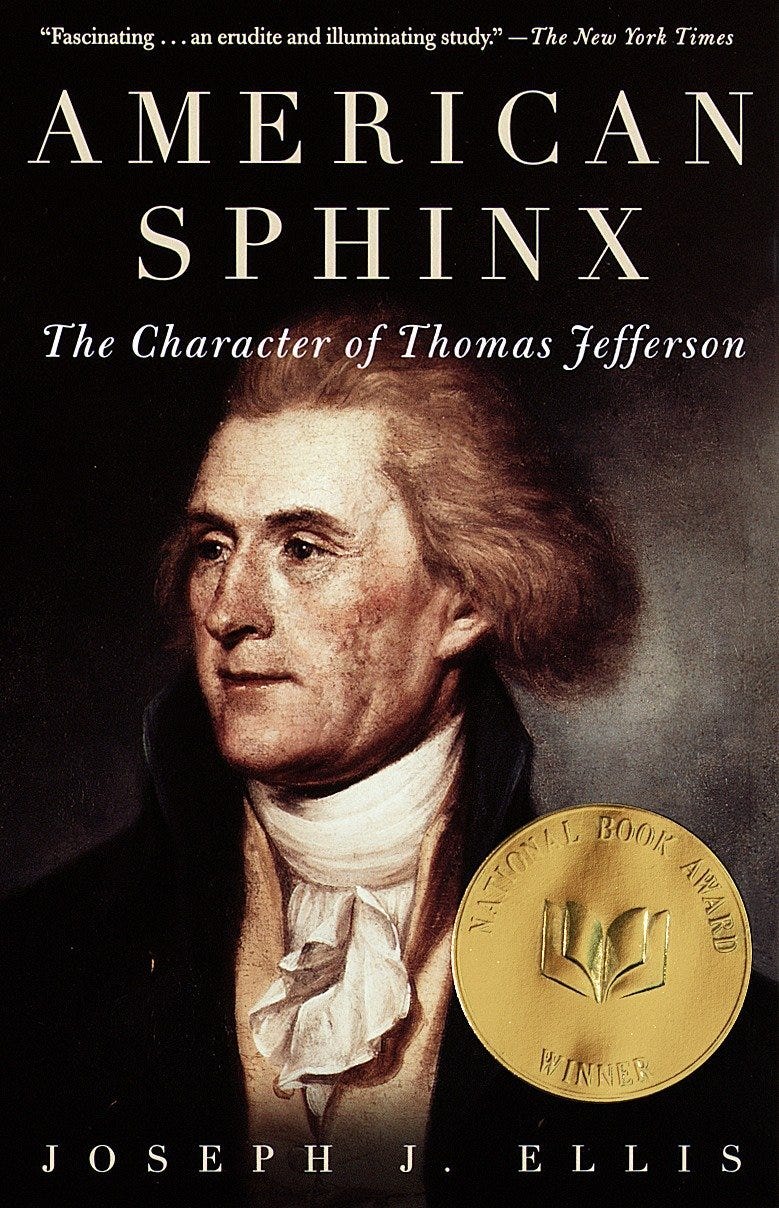American Sphinx, Oil Companies, and Semiconductors
In which I write about the Great Semiconductor Shortage of 2021
Hey everyone,
Greetings from Washington, D.C.!
Thanks for the overwhelming response to the 100th issue last week and for sharing Snapshots with your friends and colleagues. As always, I am grateful for your attention:
Our attention is our most precious resource. Over the course of writing Snapshots, I’ve realized that I’m not competing with other newsletters for it. I’m competing with your favorite influencer’s Instagram stories, your friend group’s juicy messages, and the latest fortune cookie wisdom on Twitter. Billions of dollars are spent on making these platform algorithmically perfect to maximize engagement. These are tough enemies to fight in the battle for attention. I’m grateful that you think that I’m good enough to defeat them at least once a week for a few minutes.
In this issue of the newsletter, I want to share:
American Sphinx: The Character of Thomas Jefferson by Joseph J. Ellis
How oil companies like Shell are preparing for our green(er) future
The most interesting parts of the Great Semiconductor Shortage of 2021
Ketchup, High Agency, and Nouri
Book of the week
Last weekend, I took a trip to Charlottesville, Virginia. I have some friends in D.C. who went to school there and some friends who currently live there. Between these “hey haven’t seen you in a minute” hangouts was a visit to Monticello, the home on the hill of America’s third President — Thomas Jefferson.
You are taken aback by the scale of the place. You think about what the person who wanted to live here was running away from. You think about the slaves who were forced to work on the hill to maintain Jefferson’s lifestyle. You think about the fundamental paradox of the founding of America’s democracy. You ask yourself how people who wrote about how “all men are created equal & independent” and deserve “life, Liberty and the pursuit of Happiness” can mentally reconcile their language with their actions. You think about what dimensions of moral character we are wrong in and will be judged by future generations1.
And then you think about the man who this revolves around. A man who has been adopted by both sides of the political aisle in the United States and yet remains a largely beloved character in the public imagination. George Washington is too perfect. John Adams is too serious and self-serving. Thomas Jefferson is magnanimous while being approachable and deeply flawed.
To learn more about him, I picked up American Sphinx by Joseph Ellis about his life. The book is readable and thorough but can get a bit academic at times2. The book also starts at Jefferson’s arrival at the Continental Congressional convention in 1774 in Philadelphia as a delegate from Virginia — the moment right before Jefferson’s name was to be elevated from obscurity to become one of the most important Americans to ever live. Apart from being one of the better ways to start a biography3, it also allows us a window into some of the core components of what made Jefferson the person he was:
The power of writing: Jefferson was a notoriously terrible speaker. In fact, during the entire two terms of his later Presidency, he would only give two speeches. 2 speeches in 8 years! But during the Continental Congress in 1774, he drafted many memos for the organization and became regarded as a fine mind by his peers — peers like Benjamin Franklin, John Adams, etc. He would then later go on to draft the Declaration of Independence4. What’s interesting is that no one thought that this was an important job and that’s why it was given to Jefferson who was a fine mind, but not a national political figure. The authorship of the Declaration of Independence was to become “Jefferson’s major ticket into the American pantheon.”
Ideals and reality, and how to reconcile them: Here is, on page 11, the exact moment when I knew I would like this book:
When these words [of the Declaration of Independence] are stripped of the patriotic haze, read straightaway and literally, two monumental claims are being made here. The explicit claim is that the individual is the sovereign unit in society; his natural state is freedom from and equality with all other individuals; this is the natural order of things. The implicit claim is that all restrictions on this natural order are immoral transgressions, violations of what God intended; individuals liberated from such restrictions will interact with their fellows in a harmonious scheme requiring no external discipline and producing maximum human happiness.
This is a wildly idealistic message, the kind of good news simply too good to be true. It is, truth be told, a recipe for anarchy. Any national government that seriously attempted to operate in accord with these principles would be committing suicide. But, of course, the words were not intended to serve as an operational political blueprint. Jefferson was not a profound political thinker. He was, however, an utterly brilliant political rhetorician and visionary. The genius of his vision is to propose that our deepest yearnings for personal freedom are in fact attainable. The genius of his rhetoric is to articulate irreconcilable human urges at a sufficiently abstract level to mask their mutual exclusiveness.
What an exceptional articulation of the central tension of modern American — and much of global — politics.
I’m currently enjoying the parts about Jefferson coming back from Paris (after his stint as a minister there) and setting the stage for his political heyday at Monticello. More on this next week.
If you have a friend or colleague who enjoys American history, forward this newsletter to them or share the link below. I’m going to be writing a lot more about this time period — including about the Civil War, Reconstruction, and the age of the most important industrialists ever.
Long read of the week
Shell is Looking Forward by Malcolm Harris
This was a really good read and a departure from the usual “these are dumb and greedy executives” narrative of fossil fuel-based energy companies. It was a more nuanced “these are deeply flawed executives who are really smart and are looking to save their reputations and company as reality finally catches up to them.”
Some parts I really liked:
How these companies are approaching emerging consensus around climate change:
They’re now hoping to leverage their incumbency, and fossil-fuel wealth, to lay claim to the world’s clean-energy future as well. To do that, they’ll have to persuade young people to forget who caused climate change in the first place, or at least to let bygones be bygones. And if they can transition their corporate profiles from fossil fuel to green energy without missing a profitable quarter, that wouldn’t be a repudiation of their delay strategy; it would be a vindication.
How they see the climate movements amongst the youth:
But Shell doesn’t seem to see the climate movement as the enemy or even necessarily contrary to the company’s interests. If Alexandria Ocasio-Cortez is going to rally millennials around Green New Deal legislation, then it’s a good time to become a green-energy company — or at least buy a few of those and rebrand that way. Climate protesters are just another market reality, one that can be profitable when apprehended correctly, even for a big, old oil and gas firm. The question was how to see that generational conflict coming, how to meet it and harness it and ride it into the future.
How to continue to recruit top talent:
The night before, I had learned Shell was moving into new sectors in part by buying up small firms like Greenlots (electric-vehicle-charging infrastructure) and Sonnen (smart batteries). Some of the younger Shell employees I spoke to had found themselves acquired into jobs they wouldn’t necessarily have applied for. That’s one way around a recruiting problem.
The entire essay is worth a read if you’re interested in how traditional energy companies are thinking about their future.
Business move of the week
Why are we not taking about this: The Semiconductor Shortage of 2021
If you were to ask me what’s the most important-yet-undercovered story in journalism today, it would be the global semiconductor shortage. There are very few things that you use on a daily basis that doesn’t utilize a semiconductor.
At a time when pent up consumer spending is going to be unfurled into the markets, the supply side is struggling to keep up. Part of it is due to the tension with China, which has led to both manufacturers and customers to hoard these supply of chips. There were also massive decreases in demand in the immediate aftermath of COVID last year which led to many plants decreasing or diverting chip-making capacity to other uses. All these change the flow of product through the supply chain — a phenomenon I have written about before called the bullwhip effect.
In a distribution system, as information travels from the customers to the manufacturer, it gets distorted and the result is excess quantity demanded by every link in the chain. While solutions can be successful, this seems to be an intrinsic property of supply chains.
It’s also a fascinating problem to solve for if you’re a semiconductor manufacturer. Fabrication plants cost billions of dollars to build and outfit with the right machinery. They also take many years. Do you decide that this is a sign to come and plan to massively expand capacity? Or do you think to yourself that this is probably a temporary wrinkle that will be ironed out by market dynamics?
There is chaos in the proverbial streets of global semiconductor commerce.
But as one of the most notorious characters in Game of Thrones Petyr Baelish aka ‘Littlefinger’ said, “Chaos is a ladder.” And there are certainly candidates who are trying to climb it. Chief amongst them is the chief of them — Taiwan based Taiwan Semiconductor Manufacturing Company (TSMC) has outlayed billions of dollars for expanding capacity. The incumbent position has allowed them to bet on the future while the upstarts are scrambling to deliver in the present.
There is a larger point here. Modern supply chains operate with just-in-time manufacturing and delivery constraints. This leads to unparalleled efficiency at the cost of slack in the system — which is a feature not a bug in times of crisis. Supply chains are not the most nimble of systems, so your irreversible decisions should be more conservative in nature compared to decisions that you can easily undo.
Odds and ends of the week
Two articles and a video to end today’s issue:
🍅 Ketchup Shortage Creates New Market for All Your Old Packets: Semiconductors are not the only thing to be facing a shortage right now. Enter Ketchup packets. To whoever said that there is no way 2021 is going to be less weird than 2020…
📚️ Giving generously: how Principles went from PDF to Book: Eric Weinstein has this concept of a “high agency person” and I don’t think I’ve seen a better example of this than the story of how Phil Caravaggio turned Ray Dalio’s Principles from an obscure PDF into the success that it is today.
🥘 24 Hours Inside A Michelin Star Kitchen: Restaurant Nouri: There is much to be learned from the world’s best restaurants. This video takes you inside one of them.
That wraps up this week’s newsletter. You can check out the previous issues here.
If you want to discuss any of the ideas mentioned above or have any books/papers/links you think would be interesting to share on a future edition of Sunday Snapshots, please reach out to me by replying to this email or sending me a direct message on Twitter at @sidharthajha.
Until next Sunday,
Sid
The raising of cattle, poultry, and seafood for consumption of their meat will almost certainly be a practice that will not be looked upon favorably by our ancestors. I am sure there are plenty others.
Fun fact: I considered doing a History minor in college but was dismayed by the focus on the academic parts of the subject. Important work sure, but not for me. At the end, I was happy to be one layer of abstraction above it.
As always, Robert Caro’s introduction of Lyndon Johnson’s ambition in The Path to Power remains the gold standard. You read about how Johnson refused to buy stock in an oil company for pennies on the dollar because it would “kill him politically” despite being from Texas — with Texas being a state where you can hardly afford to avoid connections to oilmen. It would kill him politically because of his aspirations to a higher office — the only office he ever aspired to.
A copy of which I have still not seen because of the closure of the Library of Congress due to COVID. But happy days will be here soon as many museums are opening up in May and hopefully the Library of Congress isn’t too far behind.


